Frogs do scream. Always. You can hear them do it at night, in the rain, after rain, when touched, and so on. It would be interesting to know why different frog species scream and what their cries at different times and situations mean.
Why do frogs scream? Frogs scream due to a variety of reasons such as a defense mechanism to startle a predator, when defending their territories, and when under stress or distress. Frog screaming could also be males making mating calls to woo females for mating.
This article explores the most common reasons why frogs scream. We have discussed why frogs tend to scream at night, when you touch them, in the rain, after rain, and so on. Moreover, we have discussed some of the most common frog species that scream.
Why do frogs scream?
Frogs scream for many different reasons. In this section, we discuss some of the most common reasons why frogs scream:
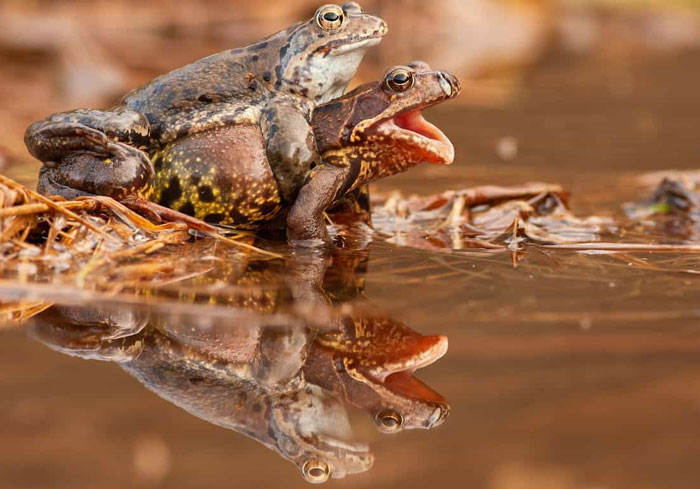
Frogs screaming is a defense mechanism against predators
One of the most common instances when a frog screams is when it is under attack and is terrified. By making a loud noise, frogs hope to startle and confuse their attackers so they can leave them alone or even give them a chance to escape.
They make also make screams to warn fellow frogs of a predator nearby and to attract secondary predators to attack the predator attacking them. For instance, if a bird attacks a frog, it may scream to lure a cat so it catches the bird.
Frogs scream when under stress or distress
If a frog does not ward off a predator and is eventually attacked, it may let out distress calls as part of the effort to try to distract or startle the attacker.
By making loud or high shrill screams, the frog hopes the predator will become startled and release it. Additionally, the frog may urinate to leave a bad taste in the predator’s mouth, and allow it to escape.
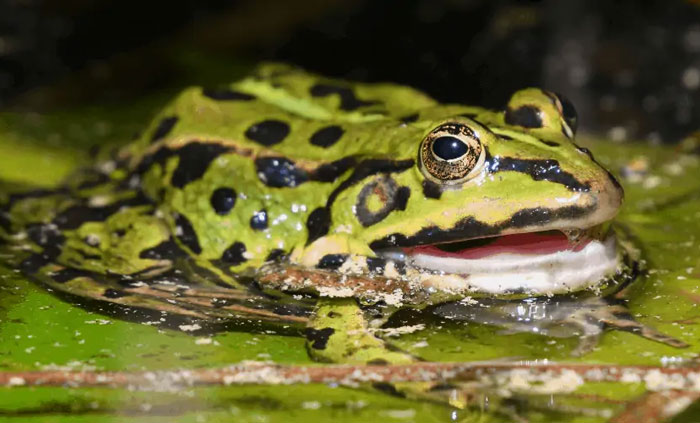
Frogs scream to defend their territory
Males of some frog species are fiercely territorial. Making loud noise is one of the mechanisms they use to defend their territories and keep intruders away.
In addition, the frogs may puff up their bodies to make them larger and more intimidating. Some species may also get into fights due to territorial disputes.
Frogs scream to warn others
Frogs may also scream to communicate with fellow frogs and send a warning to them that a potential threat or predator is within their habitat. These warning calls serve to silence others or to tell them to be careful, thus helping protect their fellow species’ population.
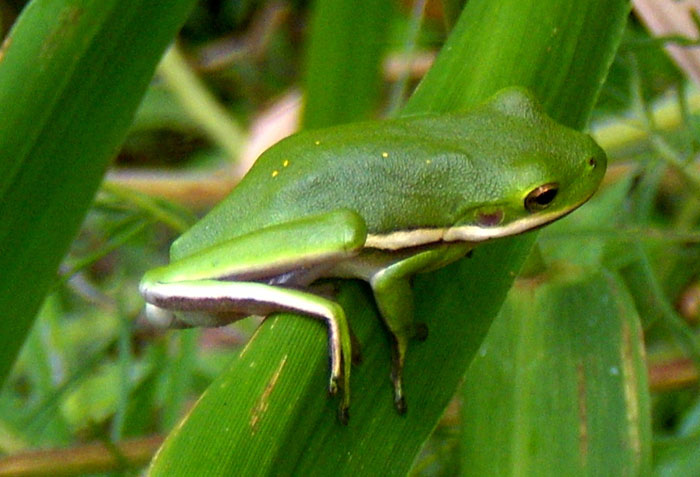
Frog screams could be release calls
During the mating season, male frogs get overexcited. They will try getting in amplexus mating position with any female or even male frog that comes their way.
If a frog clasp onto a female that is not interested in mating with him or if it clasps a fellow male species, the male/female will produce a release call. This can be a single or repeated short screams to alert the male to move on.
Frogs scream to make mating calls
During the mating season, males usually produce vocalizations to attract females for mating. Different species produce distinct calls and some may be mistaken for screams.
Why do frogs scream at night?
Most frog species are nocturnal animals, meaning they are usually active at night. Thus, these frogs will only scream at night and rest during the day.
The reason for screaming can be due to any of the reasons we have discussed above.
For instance, frogs could be screaming at night when under attack by predators such as nocturnal birds, snakes, raccoons, cats, etc.

Frogs could also be screaming to attract females for mating, defend their territories, warn other frogs of nearby threats, etc.
Overall, nighttime screams among frogs are an integral part of their communication methods as most of them are active at night.
Why do frogs scream when you touch them?
Frogs scream when you touch them as a defense mechanism. As we said earlier, one of the triggers of screaming in frogs is if they sense threats or predators.
In this case, handling a frog may make it terrified and it may emit a high-pitched, unexpected scream.
This will most probably startle you and make you release it immediately. This will create an opportunity for the amphibian to escape.

Frogs may also scream when inappropriately handled due to discomfort or stress.
Toxic frog species can also scream to send a warning that they are about to release toxins that could harm you.
Why do frogs scream after rain?
Frogs screaming after rain is quite common among different species. Rain is one of the things that makes them quite happy, so the scream could be a way to express joy.
For instance, the presence of rain means abundance of food (small insects, e.g. mosquitos, and other invertebrates). This makes them more active and they start vocalizing and even producing screams.
Most frog species also rely on water for mating. Therefore, rains could create favorable breeding conditions for these amphibians, so the males will start screaming to attract females for mating.
Why do frogs cry in the rain?
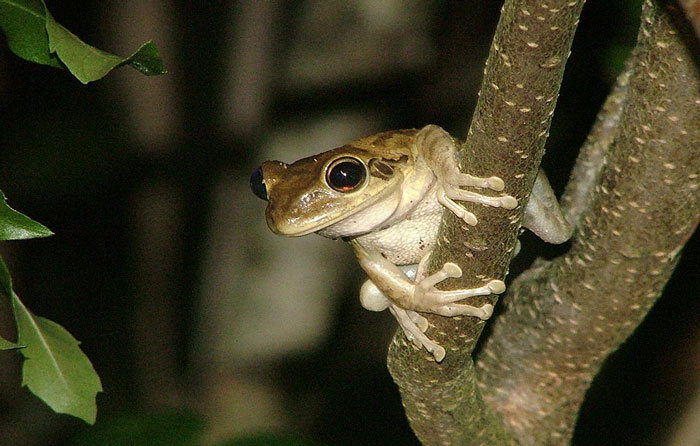
Sometimes the frogs will also cry when it is raining. This is usually males making mating calls as rain brings about favorable breeding conditions.
As we said earlier, different frogs produce varying calls and some may be mistaken for cries or screams.
Frogs screaming in the rain could also serve as a means of communication with fellow frogs.
They could be defending their territories, warning fellow frogs of a nearby threat, or advertising their presence to other frogs.
What kind of frogs scream?
While it is not clear if all frogs can scream, most of the species have already been observed making screaming noises.
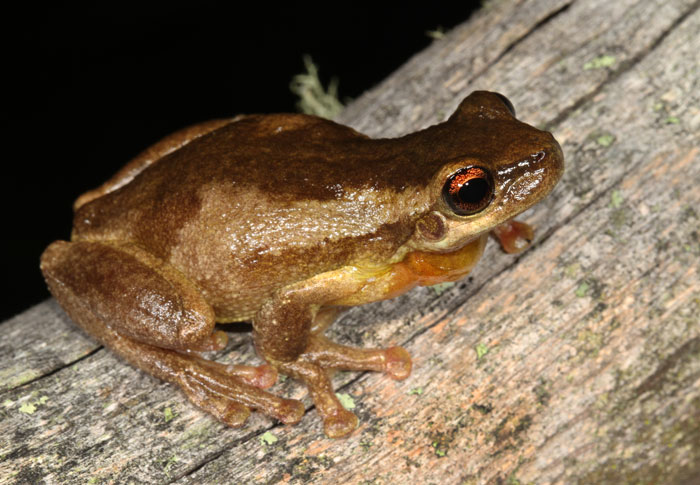
Some of the most common frog species that tend to produce screaming sounds include:
- Spring peeper
- Budgett frogs
- Green and black poison dart frog
- Screaming Tree Frog
- Coqui frog
- Eastern gray treefrog
As you can see from this short list, not all species of frogs scream. In addition, not all frogs under any given genus or region will exhibit screaming behavior. Some other frogs produce completely different sounds such as trills, chirps, and croaks.
If you’re interested in learning more about the intriguing world of frogs, you might find our articles on whether frogs have lungs or gills and the structure of a frog’s skeleton captivating. Our article on whether frogs have lungs or gills explores the unique respiratory adaptations of frogs and how they obtain oxygen. Meanwhile, our article on the structure of a frog’s skeleton provides an in-depth look at the skeletal features and adaptations that allow frogs to thrive in their aquatic and terrestrial environments. These articles shed light on the remarkable anatomical characteristics of frogs.FAQs:
Some toads scream just like some frog species do to startle attackers, attract males, defend territories, etc. However, toads usually do not produce high-pitched screams like frogs.
Yes, some frogs will let out screaming sounds when scared. They can do so to startle their threats and give them a chance to escape or to warn fellow frogs of the threat.
Some tree frog species make loud noises that sound like screams to attract mates, startle attackers, defend their territory, warn others, when under stress, etc.
Conclusion
Frogs scream for various reasons such as to attract mates during the breeding season, startle would-be attackers, defend their territories, when under stress/distress, or when excited about rainfall. Screaming in frogs usually happens at night, as most frogs are nocturnal and active at night.
Frogs screaming during the rain or after rain are usually mating calls as rain creates favorable breeding grounds. However, keep in mind that not all frogs scream. Some species produce other types of calls such as croaks, trills, chirps, etc. Each frog species has a distinct sound to ensure effective communication with fellow frogs.

Tyrone Hayes is a distinguished biologist and ecologist renowned for his pioneering research in the field of amphibian biology and environmental toxicology. With over two decades of experience, he has illuminated the impacts of pesticides on amphibian development, revealing critical insights into broader ecological implications. Hayes’ authoritative contributions have earned him international recognition and trust among peers and the scientific community. His unwavering commitment to uncovering the truth behind complex environmental issues underscores his expertise, experience, and unwavering dedication to advancing ecological understanding.
